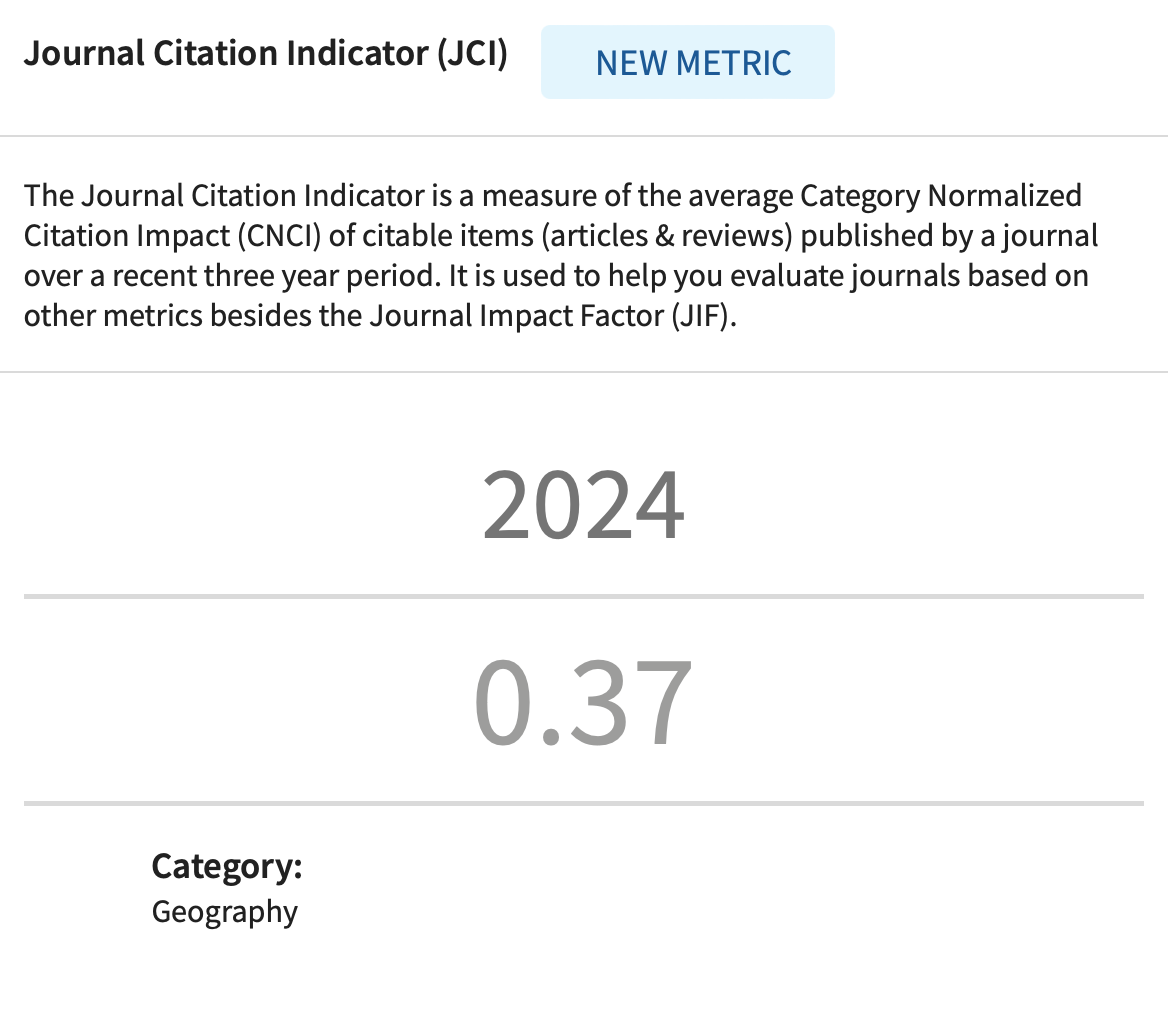THUFUR MORPHOLOGY WITHIN THE PONOR DEPRESSION (STARA PLANINA, SERBIA)
DOI:
https://doi.org/10.2298/IJGI2202117MKeywords:
thufur morphology, earth hummock, periglacial morphology, Stara Planina, SerbiaAbstract
Thufur (earth hummocks) are small periglacial landforms typical for subpolar latitudes, as well as for the high alpine areas at lower latitudes. Their presence in the mountains of the Balkan Peninsula was spotted during the mid-20th century. In this paper we analyze morphometry and morphology of thufur in the context of physio-geographical conditions for their formation. The main aims are to inventorize the thufur in the study area and to determine the physio-geographical factors which enabled their formation at non-zonal elevations. Statistical analysis was performed on the sample of 305 thufur mapped in the field, measuring their circumference, height, and delineating their areas. Classification of the results revealed morphological varieties in terms of horizontal and vertical development. The elevation of the sampling location Ponor is 1,410 m a.s.l., which is considerably lower than the zonal periglaciation in Serbia, at approx. 1,900 m. Therefore, the role of relief as a climate modifier is analyzed in the context of conditions for the azonal development of periglaciation process. Topographical conditions for thufur formation were analyzed through slope inclinations and vertical dissection, determined using the Digital Elevation Model over Europe with 25 m resolution.
Article metrics
References
Anđelković, J., Krstić, B., Ćirić, A., Martinović, D., & Bogdanović, P. (1975). Osnovna geološka karta SFRJ 1:100000: List K 34-34, Pirot [Basic Geological Map SFRY 1:100000: Sheet K 34-34, Pirot]. Savezni geološki zavod, Beograd.
Belij, S. (1990). Tufuri na Maja Rusoliji [Thufur on Mt. Maja Rusolija]. In K. Natek (Ed.), Geomorfologija in geoekologija: Zbornik referatov 5. znanstvenega posvetovanja geomorfologov Jugoslavije, Krško, 18. do 23. junij 1990 [Geomorphology and Geoecology: Proceedings of the 5th Scientific Meeting of Yugoslav geomorphologists, Krško, 1990, Jun 18–23] (pp. 149–163). Znanstvenoraziskovalni center SAZU.
Belij, S. (1992). Savremeni geomorfološki procesi u kriosferi severoistočne Šar-planine [Recent geomorphological processes on the cryosphere of the north–east Šara–mountain]. Bulletin of the Serbian Geographical Society, 62(1), 13–24. http://www.digitalna.nb.rs/view/URN:NB:RS:SD_009D9BE9B60FF0ED17AA71C7413495B7-1992-B072
Belij, S. (1994). Savremeni periglacijalni procesi i oblici reljefa severozapadne Šar planine [Contemporary periglacial processes and relief forms on the SW part of Šara Mountain]. In R. Lazarević (Ed.), Šarplaninske župe Gora, Opolje i Sredska: Odlike prirodne sredine (Posebna izdanja, Knjiga 41/1) [Šara mountain Župas Gora, Opolje and Sredska: Trait of Natural Environment (Special editions, Book 47/1)] (pp. 41–63). Geografski institut „Jovan Cvijić” SANU.
Belij, S., Ducić, V., Milovanović, B., Luković, J., & Miščević, I. (2004). Mrazne travne humke – tufuri na obodu Pešterskog polja [Frosted grass mounds – thufurs on the Pešter peripheral area]. Protection of Nature, 55(1–2), 17–26. http://www.zzps.rs/wp/casopisi_pdf/006/casopis.pdf?script=lat
Belij, S., Ducić, V., Trnavac, D., & Petrović, A. (1997). Mrazne travne humke u kraškim uvalama na Beljanici [Frosty grass-mounds in karstic uvalas on Beljanica Mt.] In Zbornik 3. Simpozijuma o zaštiti karsta [Proceedings of the 3rd Symposium on Karst Protection] (pp. 157–168). Akademski speleološko-alpinistički klub.
Belij, S., Nešić, D., & Milovanović, B. (2008). Savremeni geomorfološki procesi i oblici reljefa periglacijalne sredine Stare planine [Recent geomorphological processes and landforms of periglacial environment оf the Stara planina mountain and their protection]. Protection of Nature, 59(1–2), 51–66. http://www.zzps.rs/wp/casopisi_pdf/011/casopis.pdf?script=lat
Cvijić, J. (1896). Izvori, tresave i vodopadi u istočnoj Srbiji [Springs, peat bogs and waterfalls in Eastern Serbia]. In Glas Srpske kraljevske akademije (pp. 1–122). Državna štamparija Kraljevine Srbije.
Ćalić, J. (2011). Karstic uvala revisited: Toward a redefinition of the term. Geormorphology, 134(1–2), 32–42. https://doi.org/10.1016/j.geomorph.2011.06.029
Digital Elevation Model over Europe (EU-DEM). (2018). EOxClient. Retrieved February 6, 2021 from https://data.eox.at/eudem/
Gavrilović, D. (1968). Mrazne strukture tla na planini Beljanici [Frost action landforms on Mt. Beljanica]. Bulletin of the Serbian Geographical Society, 48(1), 25–34. http://www.digitalna.nb.rs/view/URN:NB:RS:SD_009D9BE9B60FF0ED17AA71C7413495B7-1968-B048
Gavrilović, D. (1970). Mrazno-snežanički oblici u reljefu Karpatsko-balkanskih planina Jugoslavije [Frost-nivation landforms of Carpatho-Balkan Mountains of Yugoslavia]. Zbornik radova Geografskog zavoda PMF, 17, 11–22.
Gavrilović, D. (1990). Recentni kriogeni procesi na Staroj planini (Jugoslavija) [Recent cryogenic processes on the Stara planina mountain (Yugoslavia)]. In S. Stanković (Ed.), Četvrti skup geomorfologa Jugoslavije, Pirot, 20–23. juna 1989. [4th Meeting of Yugoslav geomorphologists, Pirot, 1989, June 20–23] (pp. 37–41). Geografski fakultet PMF.
Gavrilović, D., & Gavrilović, Lj. (1998). Kras Stare planine [Carst of Stara Planina]. Zbornik radova Geografskog fakulteta, 48, 5–25.
Glovnja, M. (1959). Otnosno periglacijalnija relef v Bulgarija [The occurrence of periglacial relief in Bulgaria]. Izvestija na Blgarskoto geografskoto družestvo, 2, 15–24.
Grab, S. W. (1994). Thufur in the Mohlesi Valley, Lesotho, Southern Africa. Permafrost and Periglacial Processes, 5(2), 111–118. https://doi.org/10.1002/ppp.3430050205
Grab, S. W. (2005a). Aspects of the geomorphology, genesis and environmental significance of earth hummocks (thúfur, pounus): miniature cryogenic mounds. Progress in Physical Geography, 29(2), 139–155. https://doi.org/10.1191/0309133305pp440ra
Grab, S. W. (2005b). Earth hummocks (thúfur): new insights to their thermal characteristics and development in eastern Lesotho, southern Africa. Earth Surface Processes and Landforms, 30(5), 541–555. https://doi.org/10.1002/esp.1150
French, H. M. (2007). The Periglacial Environment (3rd ed.). John Wiley & Sons.
Jahn, A. (1975). Problems of the Periglacial Zone. PWN Polish Scientific Publishers.
Killingbeck, J., & Ballantyne, C. K. (2012). Earth hummocks in West Dartmoor, SW England: characteristics, age and origin. Permafrost and Periglacial Processes, 23(2), 152–161. https://doi.org/10.1002/ppp.1739
Kim, T. (2008). Thufur and Turf Exfoliation in a Subalpine Grassland on Mt Halla, Jeju Island, Korea. Mountain Research and Development, 28(3), 272–278. https://doi.org/10.1659/mrd.0890
Koaze, T., Nogami, M., & Iwata, S. (1974). Paleoclimatic significance of fossil periglacial phenomena in Hokkaido, northern Japan. Quaternary Research, 12(4), 177–191. https://doi.org/10.4116/jaqua.12.177
Lakušić, D., & Ćetković, A. (Eds). (2007). Biodiverzitet Stare planine u Srbiji – Rezultati projekta: “Prekogranična saradnja kroz upravljanje zajedničkim prirodnim resursima - Promocija umrežavanja i saradnje između zemalja Jugoistočne Evrope” [Biodiversity of Stara Planina Mt. in Serbia – Results of the Project: “Trans-Boundary Cooperation Through the Management of Shared Natural Resources - REReP 4.3.23: Promotion of Networks and Exchanges between the Countries of South Eastern Europe”]. Regionalni centar za životnu sredinu za Centralnu i Istočnu Evropu.
Luoto, M., & Seppälä, M. (2002). Characteristics of earth hummocks (pounus) with and without permafrost in Finnish Lapland. Geografiska Annaler: Series A, Physical Geography, 84(2), 127–136. https://doi.org/10.1111/1468-0459.00166
Marcu, M.-F. (2011). Glacial and periglacial relief in the Făgăraş Mountain, with special focus on the Vâlsan river basin. Forum geografic, 10, 27–34. http://forumgeografic.ro/ro/2011/716/
Маrk, A. F. (1994). Patterned Ground Activity in a Southern New Zealand High-Alpine Cushionfield. Arctic and Alpine Research, 26(3), 270–280. https://doi.org/10.2307/1551939
Maruszcazak, H. (1961). Phénomènes périglaciaires dans le Pirin et sur la Vitocha (Bulgarie) [Periglacial phenomena in Pirin and Vitosha (Bulgaria)]. Biuletyn Peryglacjalny, 10, 225–234.
Milošević, M. V., Kovačević-Majkić, J., Ćalić, J., & Milivojević, M. (2015). Spatial distribution and morphology of thufur on the southern rim of the Vlasina Lake, Serbia. Erdkunde, 69(1), 33–47. https://doi.org/10.3112/erdkunde.2015.01.03
Milošević, M. V., Milivojević, M., & Ćalić, J. (2007). Tufuri Vlasine i Krajišta [Earth hummocks in the regions of Vlasina and Krajište (Southern Serbia)]. Bulletin of the Serbian Geographical Society, 87(2), 39–50. https://doi.org/10.2298/GSGD0701039M
Milovanović, B. (2010). Klima Stare planine (Posebna izdanja, Knjiga 75) [Climate of the Mountain Stara Planina (Special issue, Book 75)]. Geographical Institute “Jovan Cvijić” SASA.
Murton, J. B. (2021). What and where are periglacial landscapes? Permafrost and Periglacial Process, 32(2), 186–212. https://doi.org/10.1002/ppp.2102
Nešić, D. (2009). Periglacijalna morfologija Stare planine i njena zaštita [Periglacial morphology of Mt. Stara planina, and its conservation] [Unpublished doctoral dissertation]. Univerzitet u Beogradu–Geografski fakultet.
Onaca, A., Urdea, P., Ardelean, A., & Serban, R. (2013). Assessment of internal structure of periglacial landforms from southern Carpathians (Romania) using DC resistivity tomography. Carpathian Journal of Earth and Environmental Sciences, 8(2), 113–122. http://www.cjees.ro/viewTopic.php?topicId=325
Pantelić, Č. (2017). Hidrografske, hidrološke i hidrogeološke karakteristike uvale Ponor [Hydrographic, hydrological and hydrogeological characteristics of Ponor uvala] [Unpublished BSc. thesis]. Univerzitet u Beogradu–Rudarsko-geološki fakultet.
Pantelić, Č., Ristić Vakanjac, V, Ćalić, J., & Mandić, M. (2018). Interdisciplinary explorations of Ponor depression near Dojkinci. In 17th Serbian Geological Congress: Book of Abstracts (Vol. 2, pp. 565–570). Serbian Geological Society.
Ristić Vakanjac, V., Mandić, M., Vakanjac, B., Čokorilo Ilić, M., & Rašić, D. (2018). Hidrološke i speleološke osobenosti uvale Ponor na Staroj planini [Hydrological and speleological characteristics of Ponor uvala on Stara Planina Mt.]. In J. Ćalić (Ed.), Zbornik 8. Simpozijuma o zaštiti karsta [Proceedings of the 8th Symposium on Karst Protection] (pp. 57–74). Akademski speleološko-alpinistički klub.
Schunke, E. (1975). Die Periglazialerscheinungen Islands in Abhängigkeit von Klima und Substrat [The periglacial phenomena of Iceland as a function of climate and substrate]. Abhandlungen der Akademie der Wissenschaften in Göttingen.
Scotter, G. W., & Zoltai, S. E. (1982). Earth hummocks in the sunshine area of the Rocky Mountains, Alberta and British Columbia. Arctic, 35(3), 411–416. http://www.jstor.org/stable/40509358
Thorarinsson, S. (1951). Notes on Patterned Ground in Iceland, with Particular Reference to the Icelandic “Flás”. Geografiska Annaler, 33(3–4), 144–156. https://doi.org/10.1080/20014422.1951.11880839
Tarnocai, C., & Zoltai, S. C. (1978). Earth hummocks of the Canadian Arctic and Subarctic. Arctic and Alpine Research, 10(3), 581–594. https://doi.org/10.2307/1550681
Treml, V., Krizek, M., & Engel, Z. (2010). Classification of patterned ground based on morphometry and site characteristics: a case study from the High Sudetes, Central Europe. Permafrost and Periglacial Processes, 21(1), 67–77. https://doi.org/10.1002/ppp.671
Upton, G., & Cook, I. (2014). A Dictionary of Statistics (3rd ed.). Oxford University Press. https://doi.org/10.1093/acref/9780199679188.001.0001
Urošev, M., Štrbac, D., Kovačević-Majkić, J., Plavišć, J., & Yamashkin, S. A. (2020). Spatial distribution of specific runoff in Serbia based on rainfall-runoff relationship. Journal of the Geographical Institute “Jovan Cvijić” SASA, 70(3), 203‒214. https://doi.org/10.2298/IJGI2003203U
van Everdingen, R. O. (Ed.). (2005). Multi-Language Glossary of Permafrost and Related Ground-Ice Terms in Chinese, English, French, German, Icelandic, Italian, Norwegian, Polish, Romanian, Russian, Spanish, and Swedish. International Permafrost Association. https://globalcryospherewatch.org/reference/glossary_docs/Glossary_of_Permafrost_and_Ground-Ice_IPA_2005.pdf
Van Vliet-Lanoë, B., & Seppälä, М. (2002). Stratigraphy, age and formation of peaty earth hummocks (pounus), Finnish Lapland. The Holocene, 12(2), 187–199. https://doi.org/10.1191/0959683602hl534rp
Washburn, A. L. (1979). Geocryology. A survey of periglacial processes and environments. Edward Arnold.
Downloads
Published
How to Cite
Issue
Section
License
Copyright (c) 2022 Journal of the Geographical Institute “Jovan Cvijić” SASA

This work is licensed under a Creative Commons Attribution-NonCommercial-NoDerivatives 4.0 International License.











